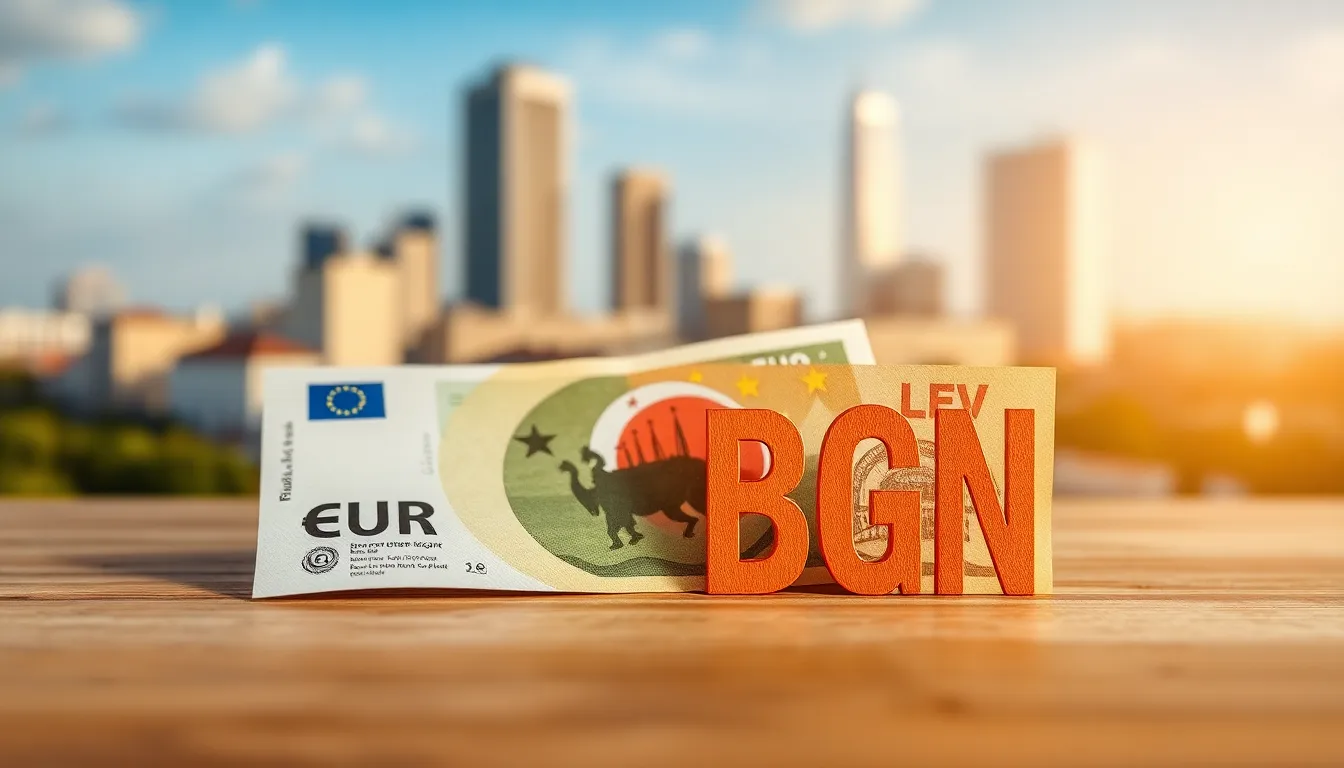Navigating the world of currency exchange can be a daunting task, especially when dealing with fluctuating rates. The EUR to BGN exchange rate holds significant importance for travelers, investors, and businesses alike. Understanding this rate not only helps in making informed financial decisions but also aids in planning trips to Bulgaria or investing in its economy.
As the euro and the Bulgarian lev interact on the foreign exchange market, various factors influence their value. Economic stability, political events, and market sentiment all play crucial roles in shaping the EUR to BGN exchange rate. Keeping an eye on these dynamics is essential for anyone looking to maximize their currency transactions or gain insights into broader economic trends.
Table of Contents
ToggleOverview of EUR to BGN Exchange Rate
The EUR to BGN exchange rate reflects the value of the Euro in Bulgarian Lev. This rate is crucial for travelers and businesses in Bulgaria, as it directly influences purchasing power and investment opportunities.
The exchange rate fluctuates based on multiple factors:
- Economic Performance: Economic indicators such as GDP growth, inflation rates, and employment statistics impact currency strength.
- Political Stability: Events like elections or policy changes can influence market confidence, affecting the exchange rate.
- Market Sentiment: Investor perceptions and reactions to global events also play a role in shaping exchange rate trends.
Historically, this rate has shown volatility, with rates averaging around 1.95 BGN for 1 EUR in recent years. It’s essential for users to regularly check the latest rates through reliable financial news sources or currency converters to ensure accurate transactions.
Monitoring these factors allows individuals and businesses to make timely and informed decisions regarding currency exchange.
Factors Influencing EUR to BGN Exchange Rate


Multiple factors influence the EUR to BGN exchange rate, impacting transactions and investment decisions. Understanding these factors equips individuals and businesses with the knowledge needed for effective currency management.
Economic Indicators
Economic indicators play a crucial role in determining the EUR to BGN exchange rate. Key metrics include:
- Gross Domestic Product (GDP): A strong GDP growth rate in Bulgaria generally leads to a stronger BGN, affecting its exchange rate positively against the EUR.
- Inflation Rates: Higher inflation in Bulgaria depreciates the BGN in relation to the EUR, as purchasing power declines.
- Interest Rates: Central bank policies, especially regarding interest rates set by the Bulgarian National Bank, directly influence currency value. A rise in interest rates often attracts foreign investment, strengthening the BGN.
- Trade Balance: A favorable trade balance (more exports than imports) enhances the BGN’s value, as demand for local currency increases with rising export levels.
Political Stability
Political stability significantly impacts the EUR to BGN exchange rate. The presence of a stable political environment fosters investor confidence, which is reflected in the currency’s strength. Key aspects include:
- Government Policies: Fiscal and monetary policies, particularly those promoting economic growth and stability, affect investor perceptions and currency strength.
- Elections and Milestones: Elections or significant political events can create uncertainty, potentially leading to a depreciation of the BGN as investors react to perceived risks.
- International Relations: Bulgaria’s relationships with EU partners and other countries influence trade and investment, impacting the BGN’s strength against the EUR.
Monitoring these economic and political factors helps in making informed currency exchange decisions and understanding broader economic trends.
Historical Trends of EUR to BGN Exchange Rate
The historical trends of the EUR to BGN exchange rate reflect fluctuations influenced by various economic and political factors. The exchange rate has shown significant volatility, with average rates around 1.95 BGN for 1 EUR in recent years.
| Year | Exchange Rate (EUR to BGN) |
|---|---|
| 2019 | 1.95 |
| 2020 | 1.96 |
| 2021 | 1.97 |
| 2022 | 1.95 |
| 2023 | 1.94 |
Economic events significantly affected these trends. In periods of GDP growth, the BGN typically strengthened. For example, the Bulgarian economy reported a GDP increase of around 4.5% in 2021, which correlated with improved BGN performance. Conversely, events such as rising inflation rates often led to BGN depreciation. The inflation rate reached approximately 3.5% in 2022, contributing to shifts in the exchange rate.
Political stability plays a crucial role in historical trends. Elections and government policy changes can create uncertainty that impacts investor confidence and, consequently, the exchange rate. For instance, stability during the 2020 elections resulted in a stronger BGN compared to times of political unrest.
Long-term analysts focus on tracking these trends to make informed predictions. Changes in interest rates, particularly by the Bulgarian National Bank, directly influence exchange rates as higher interest rates generally attract more foreign investment. Understanding these historical movements provides valuable context for current exchange rate dynamics.
Current EUR to BGN Exchange Rate
The current EUR to BGN exchange rate reflects the value of 1 Euro in Bulgarian Lev. As of the latest data, the exchange rate stands at approximately 1 EUR to 1.95 BGN. Regular monitoring of this rate is crucial for travelers, investors, and businesses engaging in transactions involving these currencies.
Exchange Rate Trends
| Date | EUR to BGN Rate |
|---|---|
| January 2023 | 1.94 |
| April 2023 | 1.95 |
| July 2023 | 1.96 |
| October 2023 | 1.95 |
The table above illustrates recent fluctuations in the currency pair. It shows stability around the 1.95 BGN mark over the past months, suggesting a consistent valuation of the Euro against the Lev.
Impact Factors
Several key factors influence the current exchange rate:
- Economic Indicators: GDP growth and inflation rates directly affect the currency’s strength.
- Market Sentiment: Positive or negative investor perceptions can lead to fluctuations in the exchange rate.
- Political Stability: Stable governance enhances investor confidence, impacting the exchange rate positively.
Tracking these factors allows individuals and businesses to make informed currency exchange decisions. Regular updates from reliable financial news sources or currency converters enhance the ability to navigate exchange rate changes effectively.
Future Predictions for EUR to BGN Exchange Rate
Forecasting the EUR to BGN exchange rate involves analyzing various economic and political factors. Analysts utilize historical data, current trends, and projections to offer insight into potential future movements of the exchange rate.
- Global Economic Conditions: Global economic stability impacts the EUR to BGN exchange rate. Economic growth in Europe influences the Euro’s strength against the Lev. A robust European economy typically leads to a stronger Euro.
- Inflation Rates: Rising inflation in Bulgaria may weaken the BGN against the EUR. Analysts expect that if inflation exceeds targets, it could decrease purchasing power and impact the exchange rate.
- Interest Rate Changes: The Bulgarian National Bank’s interest rate decisions significantly affect the exchange rate. Higher interest rates can attract foreign investment, strengthening the BGN. Conversely, lower rates may weaken it.
- Political Developments: Political events, such as elections or policy reforms, influence market confidence. Stability often leads to a stronger BGN, while uncertainty may create downward pressure on the currency.
- Market Sentiment: Investor perceptions of economic and political stability shape the exchange rate. Positive sentiment regarding Bulgaria’s growth and stability may bolster the BGN, while negative sentiment could have the opposite effect.
- Technological Advancements: Embracing digital finance could affect currency exchange dynamics. Increased adoption of digital payment systems may enhance transaction efficiencies, influencing exchange rate stability.
Future predictions suggest fluctuations are likely. Continuous monitoring of relevant economic indicators, political events, and market sentiment remains crucial for individuals and businesses engaging in currency exchanges.



